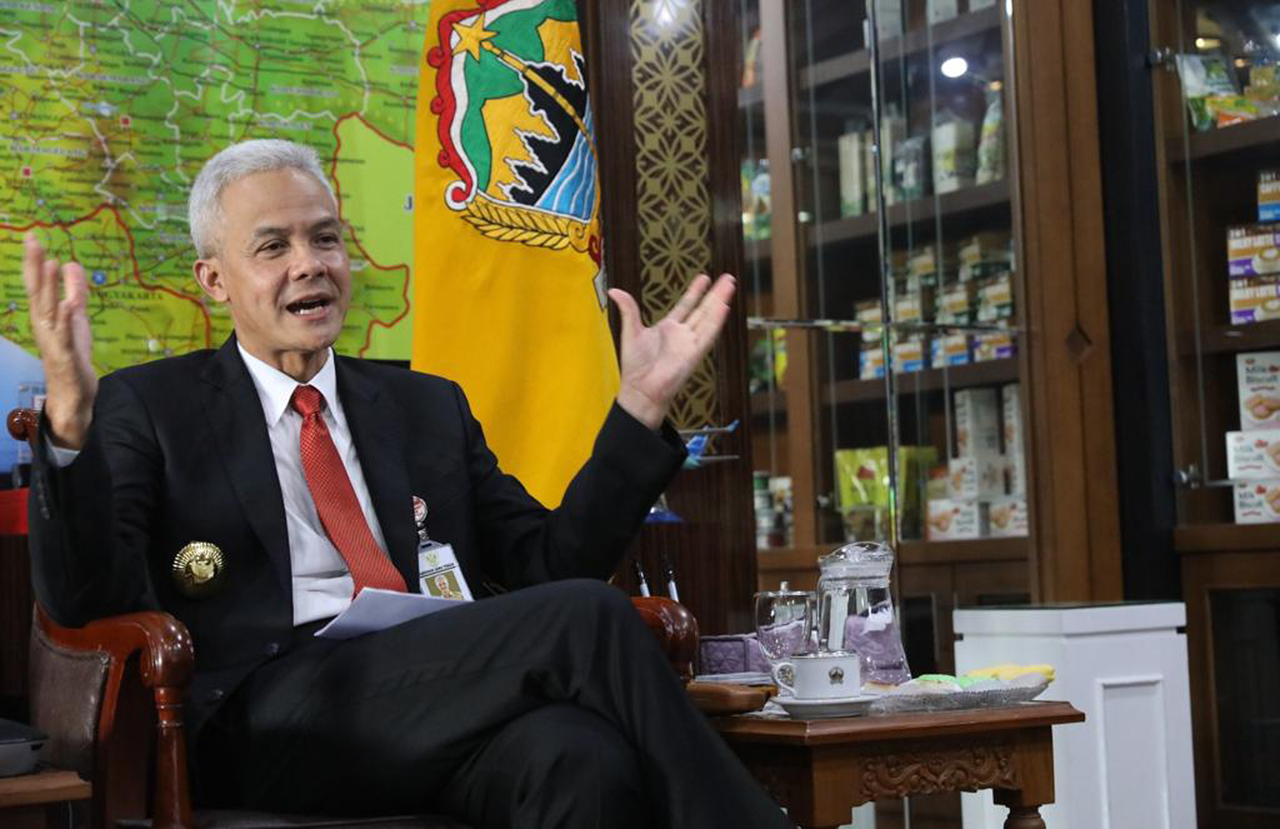A tiff with Indonesia's main political family threatens to eclipse a rising star
Sign up now: Get ST's newsletters delivered to your inbox

Central Java Governor Ganjar Pranowo declined to comment on whether he is eyeing the presidency.
PHOTO: GOVERNOR'S OFFICE
Follow topic:
JAKARTA - When parliamentary Speaker Puan Maharani, the daughter of former president Megawati Sukarnoputri, arrived at the headquarters of the Indonesian Democratic Party of Struggle (PDI-P) in Semarang, Central Java, on May 22, it was to meet 100 party leaders including district heads in person and online.
Included on the agenda: awarding a 10 million rupiah (S$928) prize, as well as Ms Puan's autograph, to the winner of a photo competition, and discussing a plan to grow vegetables at the party's headquarters.
The invite list included members of the legislative assembly and representative party elders, but explicitly stated that Central Java Governor Ganjar Pranowo was not invited.
The incident underscores the increasingly strained relationship between Mr Ganjar, 52, and his party despite a slew of opinion polls in recent months that suggest he might be the top contender to replace President Joko Widodo at elections in 2024.
For his part, Mr Ganjar says the "viral story" does not faze him.
"It doesn't affect my work. All PDI-P party officials already know that we have to do our own portion of work, be it as a governor, mayor or in Parliament. You do the best at your job and no need to think of anything else," Mr Ganjar told The Straits Times in an interview on June 3.
"The decision in regards to candidates for higher office falls to our party leader," Mr Ganjar said during the interview over Zoom from Semarang, referring to Ms Megawati.
Mr Ganjar declined to comment on whether he is eyeing the presidency.
Even so, three years into his second and final term as governor of the country's third-largest province by population, the escalating row with his party leadership, and the family of Indonesia's independence leader Sukarno, threatens to overshadow years of work touting his province's relatively low wages, infrastructure and improving governance.
Since he entered office, Central Java's gross domestic product has soared by a third when measured by 2010 prices. Foreign direct investment jumped nearly fourfold during the four years to 2019 before halving in 2020 owing to the pandemic.
In 2016, he helped shepherd into being the 2,200ha Kendal Industrial Zones - a joint venture between Singapore's Sembcorp Development and Indonesia's Jababeka, both industrial estate developers. It has so far netted nearly half a billion US dollars in investment.
New transport infrastructure such as the Trans Java expressway completed in December 2018; abundant power thanks to a new 2000MW coal-fired power plant, which went into operation last year; and monthly wages that can be little more than half of what is paid at industrial parks elsewhere on the island have been a big draw for investors.
"When it comes to labour wages, we're competitive," Mr Ganjar said. "This is what's pushing investment here."
Mr Ganjar swept to power in 2013 on the Javanese slogan "Boten korupsi dan boten ngapusi" - meaning "no corruption, no deception". He rose to prominence, helped by his carefully honed image as a reformer.
Senior bureaucrats were required to report their wealth to the graft watchdog, the Corruption Eradication Commission.
Leveraging his 3.4 million followers on Instagram and 1.9 million on Twitter, he invited members of the public to report suspected graft, including instances of civil servants demanding bribes from underlings in return for a promotion.
A 2014 video of him confronting an unscrupulous toll bridge operator who was pocketing fares has been viewed at least seven million times on YouTube.
But his use of social media has put him in the cross hairs of some members of the party, who accuse him of grandstanding. At a gathering last week, Ms Megawati chastised party members who "do too little to help the party", without naming Mr Ganjar.
Even so, should Mr Ganjar run, opinion surveys suggest he would be competitive.
Last month, in its first publicly available poll since the 2019 election, the Institute for Social and Economic Research, Education and Information (LP3ES) said Mr Ganjar ranked third with the support of 10 per cent of 1,200 respondents, out of a field of 19 potential candidates.
Jakarta Governor Anies Baswedan took 16 per cent, followed by Defence Minister and two-time presidential candidate Prabowo Subianto with 13 per cent. Ms Puan ranked 15th with 0.5 per cent.
Other polls last month from Kompas Research and Indicator Politik indicate similar rankings for the men.
LP3ES director Fajar Nursahid said Mr Ganjar may have the most potential. Mr Prabowo has twice failed to win the presidency, while Mr Anies' backing by religious conservatives at the 2017 Jakarta election has earned him the ire of a large chunk of voters.
"Pak Anies attracts a lot of negative sentiment," Mr Fajar told ST.
"If Ganjar can increase his name recognition outside Central Java, his level of support can increase and increase dramatically."
For now, his party has other ideas.
Senior PDI-P officials told ST last Saturday that they are petitioning Ms Megawati to put forward Ms Puan as the party's nominee for president with Mr Anies as her running mate.
Mr Agus Riwanto, a political analyst and lecturer at the Sebelas Maret University in Surakarta, reckons Mr Ganjar will struggle to retain his standing with the media once he leaves office a full year before the 2024 election.
"He won't be able to blow up the media like he has been able to until now," Mr Agus told ST.
"The advantage will slip to party elites like Puan."

